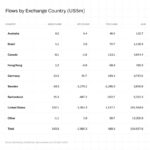In a bold move that has stirred discussions in the cryptocurrency space, Paul Grewal, the chief legal officer at Coinbase, has openly criticized the U.S. Treasury’s recent actions concerning Tornado Cash, a cryptocurrency mixer previously blacklisted for its alleged involvement in laundering significant sums tied to cybercrime. This development comes after the Treasury Department’s sanctions watchdog removed Tornado Cash from its global blacklist, along with over 100 Ethereum (ETH) addresses previously marked as Specially Designated Nationals. The platform had been accused of facilitating the laundering of a staggering 5 million linked to the notorious Lazarus group from North Korea.
According to a court filing dated March 21, the Treasury contended that the delisting of Tornado Cash resolved the contentious issue at hand, implying that a conclusive court ruling was no longer needed. However, Grewal has strongly countered this claim, alleging that the Treasury is attempting to eliminate the need for a ruling from the Fifth Circuit Court of Appeals. He emphasized that such an attempt does not hold legal validity, arguing that under the principle of voluntary cessation, a resolution must include assurances that the previously contested actions won’t reoccur.
“After grudgingly delisting Tornado Cash, they now claim they’ve mooted any need for a final court judgment. But that’s not the law, and they know it,” Grewal stated on X.
Grewal drew parallels to a legal precedent involving the FBI, where the Ninth Circuit court reversed a government claim that a lawsuit was moot due to a voluntary cessation of conduct. The previous rulings require the government to substantiate that the ceased practice cannot reasonably be expected to return. In the case of Tornado Cash, Grewal pointed out that the Treasury has not given any guarantees that it won’t re-sanction the mixer in the future.
As this legal battle unfolds, it highlights the complex intersection of law and cryptocurrency regulation, with significant implications for the future of digital asset governance in the United States. The ongoing discourse raises essential questions about the balance of regulatory power and the rights of individuals and businesses operating within the crypto landscape.

Analysis of U.S. Treasury’s Sanctions and Coinbase’s Response
Paul Grewal, the chief legal officer at Coinbase, raises important concerns regarding the U.S. Treasury’s recent actions toward Tornado Cash, a crypto mixer previously blacklisted for alleged involvement in money laundering. Here are some key points from the situation.
- Treasury’s Delisting of Tornado Cash
- Recently removed from the sanctions blacklist.
- Over 100 ether addresses were also delisted.
- The platform was originally blacklisted in 2022 for laundering 5 million linked to North Korean cybercrime.
- Legal Implications
- Treasury argues the delisting makes the court case moot.
- Grewal contends this is an attempt to avoid a decisive court ruling.
- Historical Legal Context
- Reference to the FBI v. Fikre case, where a similar argument of mootness was challenged.
- The Ninth Circuit Court required assurance that the challenged practice wouldn’t recur.
- Concerns About Future Sanctions
- No guarantee from Treasury against future blacklisting of Tornado Cash.
- This uncertainty may impact users and the crypto industry at large.
“After grudgingly delisting TC, they now claim they’ve mooted any need for a final court judgment. But that’s not the law, and they know it.” – Paul Grewal
Analyzing Coinbase’s Legal Challenge Against the U.S. Treasury’s Delisting of Tornado Cash
In a significant legal exchange, Paul Grewal, Coinbase’s chief legal officer, has taken a stand against the U.S. Treasury’s recent actions regarding Tornado Cash, a crypto mixer previously blacklisted due to its alleged involvement in facilitating money laundering for the North Korea-linked Lazarus group. This situation presents a compelling narrative in the ongoing battle between cryptocurrency platforms and regulatory bodies. By delisting Tornado Cash while simultaneously arguing that a court decision is no longer needed, the Treasury appears to be navigating a complex legal landscape. However, Grewal argues that such maneuvers could lead to future complications.
One competitive advantage for Coinbase emerges from its proactive stance in financing the court case that questions the legality of the Treasury’s decision. By actively engaging in the legal process, Coinbase positions itself as a champion of regulatory fairness and transparency within the crypto space. This not only bolsters its reputation but could also attract users concerned about compliance and legal stability. In contrast, the U.S. Treasury’s approach may be perceived as reactive and uncertain, potentially undermining public trust in governmental oversight of financial systems.
However, there are disadvantages inherent to Coinbase’s legal path. The outcome of the case could set a legal precedent that may restrict or complicate the operations of other crypto platforms. Should Grewal’s arguments fail, it may embolden the Treasury to impose stricter regulations on crypto services, complicating the operational landscape for Coinbase and similar companies. Furthermore, the ongoing litigation could divert resources and attention away from other strategic initiatives, slowing growth in a fast-paced market.
The implications of this legal discourse extend to various stakeholders within the crypto community. For individual investors and crypto enthusiasts, the clarity—or lack thereof—concerning compliance and legal standing could influence their investment decisions. Additionally, other crypto exchanges might feel the ripple effects; those who are keen on building a compliant and transparent business model may draw inspiration from Coinbase’s litigation while simultaneously fearing greater scrutiny from regulators.
On the flip side, the Treasury’s current stance could pose significant challenges for crypto entities. If Grewal’s concerns are validated, the potential for future sanctions or restrictive measures against similar platforms could become a daunting reality. This uncertainty could deter investments in the crypto sector, as stakeholders weigh the risks of government intervention against potential gains.
As the legal battle unfolds, the tensions between innovation in the cryptocurrency space and governmental oversight will likely intensify. The aftermath of this situation will be closely watched by industry participants, influencers, and regulators alike, shaping the narrative for future crypto regulations and compliance frameworks.

















